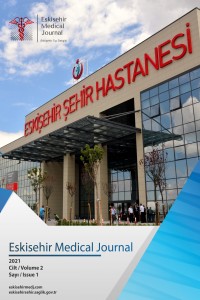Roma Mitolojisinin Tıp Terminolojisine Etkisi ve Hastalıklara Verilen İsimlerin Kökenleri
Öz
Mitoloji, insanlığın tarih öncesi zamanlarından beri dilden dile dolaşarak günümüze kadar gelmiş ve büyük hakikatler yanında modern bilimi şaşırtacak doğrulukta bilgiler
barındırabilmektedir. Günümüz tıbbında kullanılan birçok hastalık tanısının ve bunların tedavi yönteminin isimleri mitolojik efsanelerin ve kahramanların adından köken
almaktadır. Her toplum efsaneyi kendi dili ile anlatmışsa da Roma İmparatorluğu’nun bütün medeniyetlerden toplanmış olduğu bu efsanelerin günümüze ulaşmasında büyük bir payı vardır. Bu yazıda Roma Mitolojisi’nden esinlenerek isimlendirilmiş hastalıkların ve tıbbi terminolojinin kökenleri araştırılmıştır.
Anahtar Kelimeler
Tıp tarihi Literatürde tıp Mitoloji Konu olarak terminoloji Roma mitolojisi
Kaynakça
- 1. Azra Erhat. Mitoloji sözlüğü.İstanbul, Remzi Kitapevi; 2019.
- 2. Henry Ernest Sigerist. A History of Medicine: Early Greek, Hindu, and Persian medicine. Oxford University Press; 1987.
- 3. Kara AK. Yunan Mitolojisinden Roma Mitolojisine Geçen Dini Kavramlar Üzerine Bir İnceleme. Available at: http://www.academia.edu.tr. Accessed date: December 03,2020.
- 4. Žuškin E, Lipozenčić J, Cvetković JP. Ancient Medicine – a Review Acta Dermatovenerol Croat. 2008; 16(3): 149-57.
- 5. Tacitus J. Germania. In: Fuhrmann M, editor. Reclam, Philipp. Stuttgart;1989. P: 73.
- 6. Maloney MA, Kun SS, Keens TG, et al. Congenital central hypoventilation syndrome: diagnosis and management. Expert Rev Respir Med. 2018 Apr; 12(4): 283-92.
- 7. Jospe N, Florence M. Hermaphroditus in Greco-Roman myth: lessons and hypotheses for intersex today. J Pediatr Endocrinol Metab. 2004 Nov; 17(11): 1471-9.
- 8. Stahl A, Tourame P. De la tératologie aux monstres de la mythologie et des légendes antiques [From teratology to mythology: ancient legends]. Arch Pediatr. 2010 Dec; 17(12):1716-24.
- 9. Fariba K, Tadi P. Parasomnias. 2020 Oct 6. In: StatPearls [Internet]. Treasure Island (FL): StatPearls Publishing; 2020.
- 10. Huppert D, Benson J, Krammling B, et al. Fear of heights in Roman antiquity and mythology. J Neurol. 2013 Sep; 260(9): 2430-2.
- 11. Todman D. A history of caesarean section: from ancient world to the modern era. Aust N Z J Obstet Gynaecol. 2007 Oct; 47(5): 357-61.
- 12. XI. Fornaro M, Clementi N, Fornaro P. Medicine and psychiatry in Western culture: Ancient Greek myths and modern prejudices. Ann Gen Psychiatry. 2009 Oct 7; 8: 21.
- 13. Wilcox RA, Whitham EM. The symbol of modern medicine: why one snake is more than two. Ann Intern Med. 2003 Apr 15; 138(8): 673-7.
- 14. Marino IR, Tzakis AG, Fung JJ, et al. Liver xenotransplantation. Surg Technol Int. 1993 Oct; 2: 139-44.
- 15. Karenberg A. Götterwelten in der Heilkunde [The worlds of gods in medicine]. Z Rheumatol. 2017 Sep; 76(7): 630-35.
- 16. Ökten Aİ. Mythology and Neurosurgery. World Neurosurg. 2016 Jun; 90: 315-21.
The Effect of Roman Mythology on Medical Terminology and the Origins of Disease Names
Öz
Mythology has come from prehistoric times of mankind and contains great truths that surprise even modern science. Many terminologies, disease and treatment names that we use in today's medicine originate from the names of mythological legends and heroes. Although every society tells the legend in their own language, Roman Empire has a great importance in bringing these legends that the collected from all civilizations to the present day. This manuscript investigated the origins of named diseases and medical terminology inspired by Roman mythology.
Anahtar Kelimeler
History of medicine Medicine in literature Mythology Terminology as topic Roman mythology
Kaynakça
- 1. Azra Erhat. Mitoloji sözlüğü.İstanbul, Remzi Kitapevi; 2019.
- 2. Henry Ernest Sigerist. A History of Medicine: Early Greek, Hindu, and Persian medicine. Oxford University Press; 1987.
- 3. Kara AK. Yunan Mitolojisinden Roma Mitolojisine Geçen Dini Kavramlar Üzerine Bir İnceleme. Available at: http://www.academia.edu.tr. Accessed date: December 03,2020.
- 4. Žuškin E, Lipozenčić J, Cvetković JP. Ancient Medicine – a Review Acta Dermatovenerol Croat. 2008; 16(3): 149-57.
- 5. Tacitus J. Germania. In: Fuhrmann M, editor. Reclam, Philipp. Stuttgart;1989. P: 73.
- 6. Maloney MA, Kun SS, Keens TG, et al. Congenital central hypoventilation syndrome: diagnosis and management. Expert Rev Respir Med. 2018 Apr; 12(4): 283-92.
- 7. Jospe N, Florence M. Hermaphroditus in Greco-Roman myth: lessons and hypotheses for intersex today. J Pediatr Endocrinol Metab. 2004 Nov; 17(11): 1471-9.
- 8. Stahl A, Tourame P. De la tératologie aux monstres de la mythologie et des légendes antiques [From teratology to mythology: ancient legends]. Arch Pediatr. 2010 Dec; 17(12):1716-24.
- 9. Fariba K, Tadi P. Parasomnias. 2020 Oct 6. In: StatPearls [Internet]. Treasure Island (FL): StatPearls Publishing; 2020.
- 10. Huppert D, Benson J, Krammling B, et al. Fear of heights in Roman antiquity and mythology. J Neurol. 2013 Sep; 260(9): 2430-2.
- 11. Todman D. A history of caesarean section: from ancient world to the modern era. Aust N Z J Obstet Gynaecol. 2007 Oct; 47(5): 357-61.
- 12. XI. Fornaro M, Clementi N, Fornaro P. Medicine and psychiatry in Western culture: Ancient Greek myths and modern prejudices. Ann Gen Psychiatry. 2009 Oct 7; 8: 21.
- 13. Wilcox RA, Whitham EM. The symbol of modern medicine: why one snake is more than two. Ann Intern Med. 2003 Apr 15; 138(8): 673-7.
- 14. Marino IR, Tzakis AG, Fung JJ, et al. Liver xenotransplantation. Surg Technol Int. 1993 Oct; 2: 139-44.
- 15. Karenberg A. Götterwelten in der Heilkunde [The worlds of gods in medicine]. Z Rheumatol. 2017 Sep; 76(7): 630-35.
- 16. Ökten Aİ. Mythology and Neurosurgery. World Neurosurg. 2016 Jun; 90: 315-21.
Ayrıntılar
| Birincil Dil | Türkçe |
|---|---|
| Konular | Klinik Tıp Bilimleri |
| Bölüm | Derlemeler |
| Yazarlar | |
| Yayımlanma Tarihi | 6 Mart 2021 |
| Yayımlandığı Sayı | Yıl 2021 Cilt: 2 Sayı: 1 |
Kaynak Göster

Bu eser Creative Commons Alıntı-GayriTicari-Türetilemez 4.0 Uluslararası Lisansı ile lisanslanmıştır.

